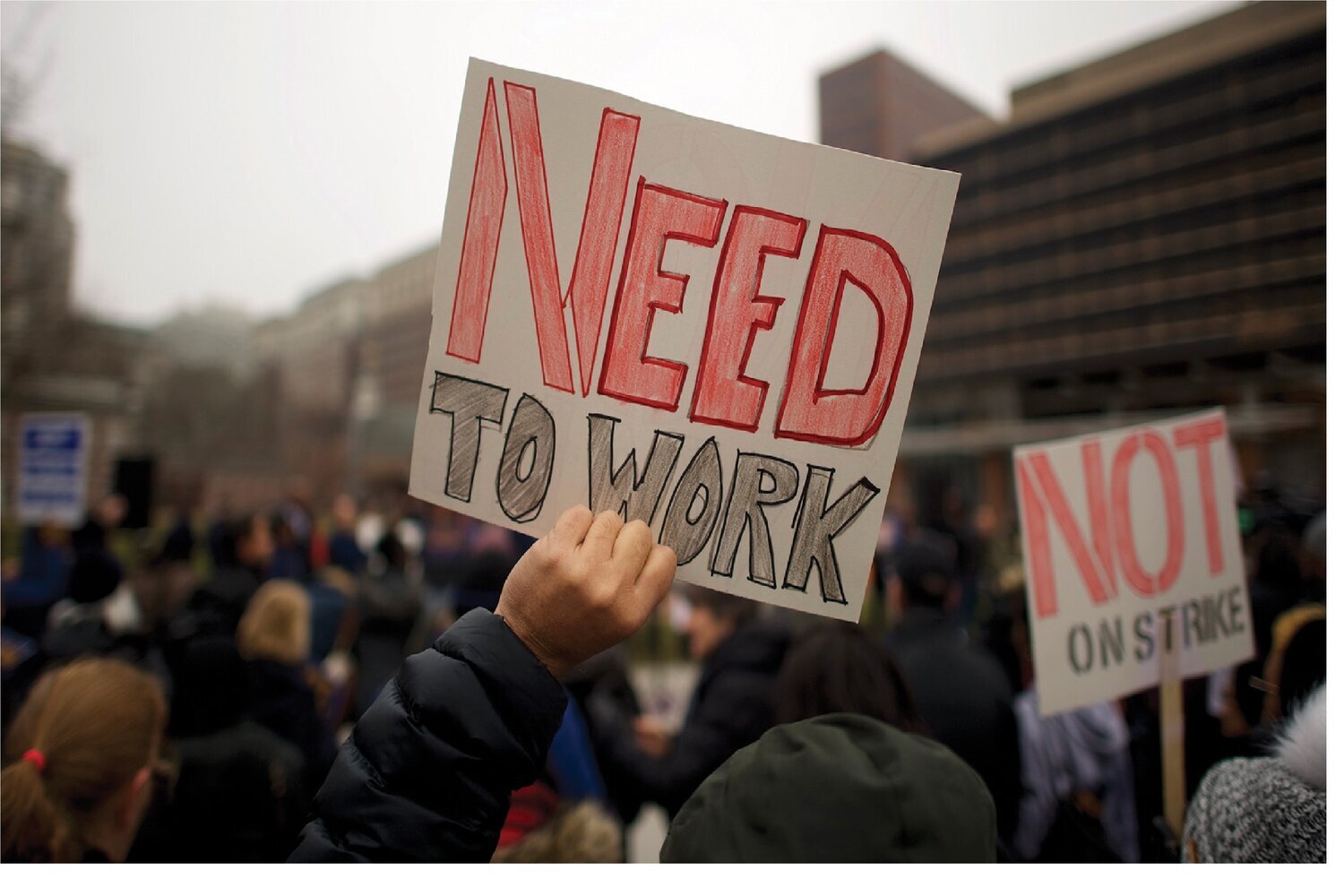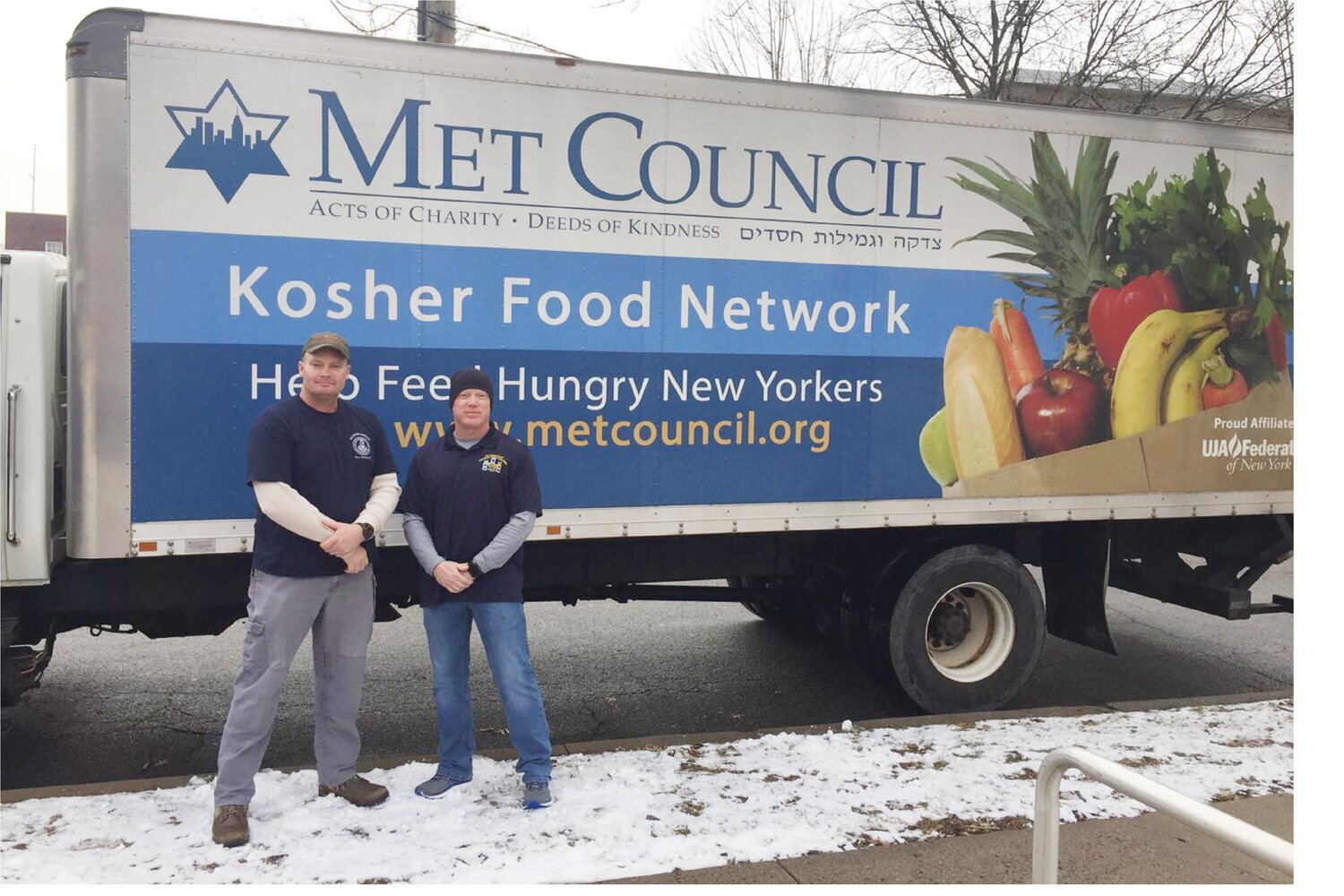UJA-Fed. approves $5 million in loans for those caught in shutdown; Met Council, other groups stepping up.
By STEWART AIN
Protesters in Philadelphia earlier this month gather to urge an end to the government shutdown.
As the partial federal government shutdown entered its second month, UJA-Federation of New York stepped in this week to help affected federal employees obtain interest-free loans from the Hebrew Free Loan Society to replace the paychecks they have missed. The charity is the latest and largest of the Jewish organizations that are pitching in to help federal employees during the shutdown.
The move comes as Senate leaders worked on bills Tuesday afternoon they hoped would end the shutdown — one that includes the $5.7 billion President Donald Trump wants to build a wall along the southern border. It was the president’s insistence on funding for the wall, and the Democrats’ refusal to go along with such funding, that led to the shutdown.
The UJA-Federation loans are restricted to impacted government employees, both Jewish and non-Jewish, who earn $40,000 a year or less and who live in the city, Westchester and Long Island. (To apply for a loan, click here to download an application.)
Among the other Jewish organizations helping affected federal employees are Met Council, the many Jewish community center food pantries and Masbia, a network of food pantries and soup kitchens in the city. Alexander Rapaport, Masbia’s executive director, said he and his volunteers went to LaGuardia and Kennedy airports last week to meet with TSA agents and inform them about his organization.
U.S. Coast Guard personnel on Staten Island receive a shipment of kosher food from Met Council.
Eric Goldstein, CEO of UJA-Federation of New York, said his organization’s board of directors approved a $5 million loan from its endowment to help HFLS run the interest-free loan program, which began this week. He said he hoped the loans would “alleviate some of the stress and worry for these individuals and their families.”
Each loan would be based upon the amount of the employee’s missed paycheck. Once the government shutdown ends, the missed paychecks of those who received the interest-free loans would be sent directly to the HFLS.
There are similar loan programs being offered by other Hebrew Free Loan Societies in the U.S., including in Washington, D.C., San Francisco, Philadelphia and Austin, Texas.
The Philadelphia program, which is funded with a $500,000 grant from an anonymous donor, is available to all affected federal employees who earn $50,000 a year or less. They are eligible for a one-time interest-free loan of $1,250, according to Rabbi Andrea Merow of Beth Sholom Congregation, which also operates one of five food pantries under the auspices of the Greater Jewish Federation of Philadelphia.
Carole Price, loan chair of the Hebrew Free Loan Association of Austin, said there are few Jewish federal employees in the community and that the association has made only one loan to date — to an air traffic controller who has a wife and three children.
“We gave him $5,000 without a guarantor,” she told The Jewish Week, adding that the program may eventually be opened to non-Jews as well.
In Washington, D.C., the HFLS has allocated $30,000 to provide loans of up to $2,000 to Jewish employees and there are plans to reach out to synagogues and other Jewish institutions for help in case the $30,000 proves insufficient.
n New York, impacted federal employees may apply for a loan each time they miss a paycheck. Goldstein noted this program is “by far the largest and is designed to benefit all furloughed workers and those working without pay. The goal is to focus on those who are most vulnerable to this partial shutdown and who live from paycheck to paycheck. We are beginning to see the terrifying consequences of what happens when people are not able to make mortgage payments and put food on their table.”
Although the average salaries of many of the 800,000 affected federal workers are far below the average $85,000 for government employees, Goldstein said the “paycheck loans” will be directed to affected federal employees who earn $40,000 or less because these are “people who live paycheck to paycheck. They have no safety net and very little savings and the shutdown creates real world hardships that we are trying to help alleviate.”
“We know there are likely thousands of people who can avail themselves of this program,” Goldstein observed. “Most TSA workers, prison guards and Coast Guard employees earn $40,000 or less, and there are thousands of those people living in our sector — New York City, Westchester and Long Island.”
Here are the requirements for the loans:
♦ Eligibility will be established by the employee’s paystub and employee ID;
♦ Employee income will determine eligibility, rather than household income;
♦ The employee’s take-home pay will establish the maximum loan per pay period;
♦ Borrowers will be required to provide one guarantor (HFLS usually requires two guarantors);
♦ Repayment will be due only when the government reopens and employees receive back wages;
♦ Contractors are not eligible for the loans
Not only are government employees impacted by the shutdown, but if the shutdown continues into March, millions of Americans on government assistance might not receive any Supplemental Nutrition Assistance Program (SNAP) benefits because it may run out of money. Information about SNAP benefits and updates on the federal shutdown’s impact on the program can be found at https://www.nassaucountyny.gov/1895/Social-Services.
In an email last Friday announcing the program to donors, Goldstein observed: “Food insecurity is a growing concern. Just yesterday, our partner, Met Council — responding to a request from the Staten Island Borough president — delivered 600 food packages to Coast Guard families. Met Council is also reporting a notable uptick in people calling, desperately worried about federally funded services.”
David Greenfield, CEO of Met Council, said that the first shipment of food to the 600 Coast Guard families at Fort Wadsworth totaled several thousand pounds and was meant to last two weeks.
“These are families who never needed help before,” he pointed out. “They have suddenly been plunged into a crisis. This is the first time they are not getting paid for work they are doing and it is really difficult to deal with that.”
Greenfield said the Coast Guard commander opened a food pantry for Met Council at Fort Wadsworth and that his organization, in addition to providing food, is also providing diapers and kids’ snacks.
“We are doing the best we can to get them products they are used to, like protein bars and brand-name cereals,” he said. “We want to maintain for them and their children as much normalcy as possible. They are out there protecting our lives. It seemed like the right thing to do, to disrupt their lives as little as possible.”
Thus, Greenfield said, the food pantry at Fort Wadsworth has been stocked with items the families are used to, including Aunt Jemima pancake mix, Quaker granola bars, Honest Tea iced tea, SkinnyPop Popcorn, and Cheerios and Raisin Bran cereals.
Met Council also operates 39 food pantries in the city and Greenfield said many have extended their hours in response to an estimated 20 percent increase in demand.
Meanwhile, volunteers with Masbia, which operates soup kitchens in Forest Hills, Queens, as well as Flatbush and Borough Park, Brooklyn, have begun distributing fliers with the addresses of the soup kitchens.
“The shutdown is deep enough that the information is starting to spread,” said Masbia’s Rapaport. “We operate with no questions asked.”
The only rule is that the food pantry may be accessed only once a week. There is no limit on hot dinners and Rapaport said that about 30 government employees showed up last week at the soup kitchens.
“That’s only a trickle and it does not represent what the need could be if this shutdown goes on for much longer,” he said. “We want to get the awareness out there. We’ve had a lot of help from social media. We’re telling people that you can negotiate with your landlord and creditors to pay when the shutdown ends, but you cannot negotiate with your stomach. You need to eat every day.”
Rapaport said that should the volume of people needing a hot meal increase substantially, Masbia might begin allowing people to take out hot, prepared food. And it also might set up a “pop-up next to a federal building. … It depends on demand.” And he stressed that impacted federal employees should not feel embarrassed about it.
“If you need help, come and get it,” he said. “There are a lot of people who want to help and share with you.”


